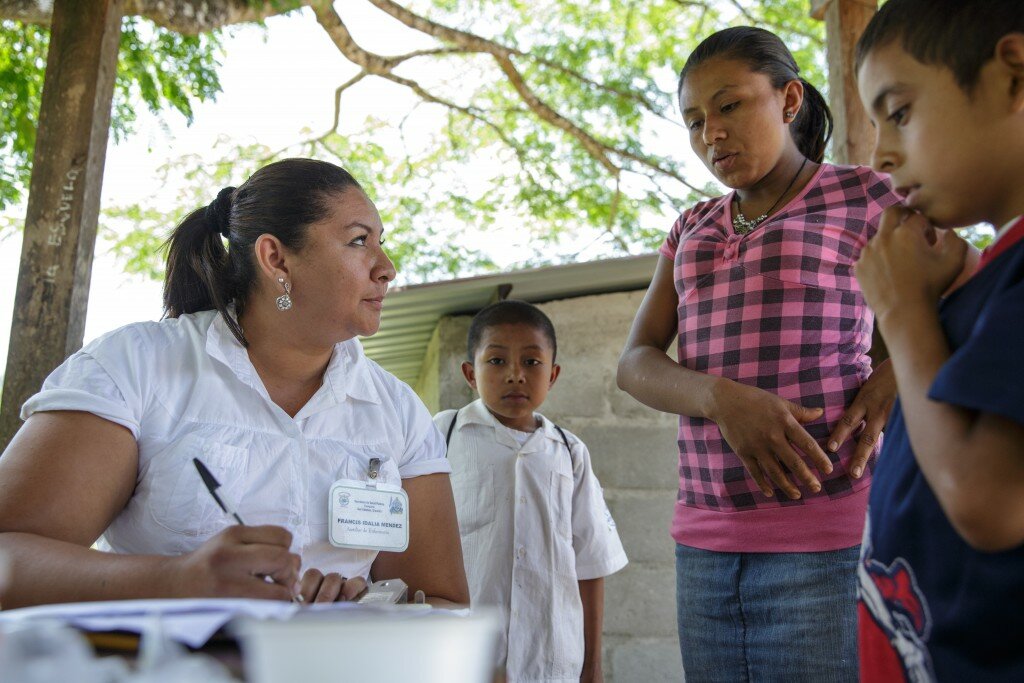
A pregnant woman speaks with a health worker during a vaccination session at the primary school in the town of Coyolito, Honduras.
The Latin American and Caribbean (LAC) region continues to inspire the world, showing how unwavering determination can help achieve public health elimination targets.
For example, earlier this year the Pan American Health Organization (PAHO) and other leading global health experts said goodbye to rubella in the Americas, a virus also known as German measles. This exciting accomplishment is the result of a concerted 15-year initiative to provide widespread provision of the MMR vaccine (measles, mumps and rubella).
Announced on April 30th, this historic achievement generated even more energy and excitement during Vaccination Week in the Americas (VWA), held during April 25th – May 2nd. VWA, a regional flagship initiative of PAHO, is an extraordinary effort led by countries to vaccinate people of all ages against rubella, measles, polio, pneumonia and other diseases. These vaccination campaigns are also used to deliver a package of life-saving health interventions, including Vitamin A supplements to boost children’s immune systems, deworming treatments that rid people of intestinal worms (a type of neglected tropical disease) and distribution of insecticide-treated nets to prevent malaria. The Guardian has highlighted VWA as one of five memorable public health movements that save millions of lives.
We are especially excited to celebrate these recent victories with a public health champion from Córdoba, Argentina, Dr. Mirta Roses, who recently visited the Sabin Vaccine Institute office in Washington, D.C. Holding medical and public health degrees, serving two terms as Director of PAHO and representing the LAC region on the Global Fund Board provides only a small snapshot of her passion for equitable access to health. We are proud to have her serve as Special Envoy for the Global Network for Neglected Tropical Diseases, speaking out on behalf of the hundreds of millions of people suffering unnecessarily from preventable diseases.
Dr. Roses began working at PAHO in 1984 – and became Director 20 years later. She took action quickly as Director, spearheading the first-ever Vaccination Week in the Americas in 2003. This annual campaign was inspired by the Sucre Agreement, signed 23 April 2002 by the Andean Ministers of Health (Colombia, Bolivia, Ecuador, Peru and Venezuela) plus Chile, recommending simultaneous implementation of their national immunization weeks. Following a 2002 measles outbreak in Venezuela and Colombia, this coordinated effort was planned to prevent future outbreaks across the Andean Region.
During the final stages of polio eradication in the Americas in 1991, Dr. Roses witnessed how the power of social communication and community involvement transformed vaccination campaigns into health celebrations. Entire villages, countries, leaders and celebrities were eager to participate, injecting a vibrant, dynamic energy into the campaigns.
Building off the momentum and success of this approach, annual Vaccination Weeks in the Americas helped create an even larger health celebration by sharing educational materials, screening for communicable and chronic diseases and delivering deworming treatments. This platform also helps early detection of NTDs, disabilities and micronutrient deficiencies.
As an example, in Honduras, the Ministry of Health uses this campaign to deliver deworming treatments to children across at the country alongside vaccines and other interventions. Honduras has also integrated water, sanitation and hygiene (WASH) practices, as well as vitamin A supplementation, as part of this effort. Since poor WASH contributes to increased intestinal worm infections, and intestinal worms can worsen and intensify malnutrition, integrating these three health interventions is essential for maximizing the health of children.
This unprecedented model caught the attention of people across the world. One by one, countries from all six WHO regions started employing the same approach – beginning with countries from the Eastern Mediterranean, reaching all the way to South-East Asia. By 2011, the World Health Organization made it official: World Immunization Week will happen every year during the last week of April.
These successes demonstrate the sharp and unwavering determination of people, communities and partnerships in the LAC region. We look forward to celebrating future success with Dr. Roses, PAHO and other partners, and inspiring other countries and regions to learn from lessons learned and best practices.

